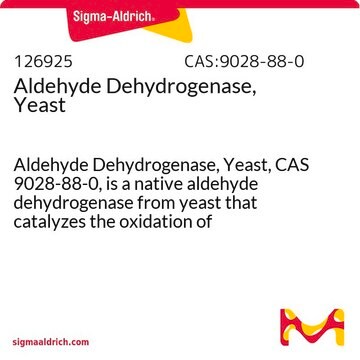A8081
Anti-Activin Receptor IIA antibody produced in goat
affinity isolated antibody, lyophilized powder
Sign Into View Organizational & Contract Pricing
All Photos(1)
About This Item
Recommended Products
biological source
goat
Quality Level
conjugate
unconjugated
antibody form
affinity isolated antibody
antibody product type
primary antibodies
clone
polyclonal
form
lyophilized powder
species reactivity
human
technique(s)
immunohistochemistry (formalin-fixed, paraffin-embedded sections): 15 μg/mL
indirect ELISA: 0.5-1.0 μg/mL
western blot: 0.1-0.2 μg/mL
UniProt accession no.
storage temp.
−20°C
Gene Information
human ... ACVR2A(92)
General description
Activin is a disulfide-linked dimeric protein released by granulosa cells in the ovary and sertoli cells in the testis. It has several functions which include bone remodeling, neural cell differentiation, reproductive physiology, hematopoiesis and mesoderm induction. Activin will not bind directly to Type I activin receptors rather it will associate with the type II receptor-activin complex and start signal transduction. Activin Receptor IIA belongs to Ser/Thr protein kinase family, is highly conserved and can bind to inhibin, BMP-2, and BMP-7 with lower affinities. Goat anti-activin receptor IIA antibody reacts specifically with recombinant human activin receptor IIA. The antibody exhibits approximately 2% cross-reactivity with recombinant human activin receptor I and recombinant human activin receptor IIB.
The antibody has the ability to block receptor-ligand interaction. In ELISA assays, it will block 50% of the binding of recombinant human activin A to recombinant human activin receptor IIA/Fc chimera.
Immunogen
recombinant human activin receptor IIA expressed in Sf 21 insect cells.
Application
Anti-Activin Receptor IIA antibody can be used in in western blotting (working concentration:-0.1-0.2 μg/mL) and indirect ELISA (working concentration -0.5-1.0 μg/mL) for detecting human activin receptor IIA.
Goat Activin Receptor IIA antibody is suitable for immunohistochemistry assays at 15μg/ml.
Goat anti-Activin receptor IIB (ActRIIB) was used to detect activin receptor IIB in muscle fibroblasts by western blot. The antibody recognized activin receptor IIB at roughly 50kDa.
Physical form
Lyophilized from a 0.2 μm filtered solution in phosphate buffered saline containing carbohydrates.
Disclaimer
Unless otherwise stated in our catalog or other company documentation accompanying the product(s), our products are intended for research use only and are not to be used for any other purpose, which includes but is not limited to, unauthorized commercial uses, in vitro diagnostic uses, ex vivo or in vivo therapeutic uses or any type of consumption or application to humans or animals.
Not finding the right product?
Try our Product Selector Tool.
Storage Class Code
12 - Non Combustible Liquids
WGK
WGK 1
Flash Point(F)
Not applicable
Flash Point(C)
Not applicable
Choose from one of the most recent versions:
Already Own This Product?
Find documentation for the products that you have recently purchased in the Document Library.
S Y Ying et al.
Proceedings of the Society for Experimental Biology and Medicine. Society for Experimental Biology and Medicine (New York, N.Y.), 214(2), 114-122 (1997-02-01)
Activin and inhibin, members of transforming growth factor-beta (TGFbeta) superfamily, have diverse and widespread effects within living organisms at many stages during growth and development. From the initial isolation of these growth factors based on their effects of FSH secretion
Magnus Diller et al.
Arthritis research & therapy, 21(1), 144-144 (2019-06-12)
Activin A and follistatin exhibit immunomodulatory functions, thus affecting autoinflammatory processes as found in rheumatoid arthritis (RA). The impact of both proteins on the behavior of synovial fibroblasts (SF) in RA as well as in osteoarthritis (OA) is unknown. Immunohistochemical
J C Smith et al.
Cell, 67(1), 79-87 (1991-10-04)
The Brachyury (T) gene is required for mesoderm formation in the mouse. In this paper we describe the cloning and expression of a Xenopus homolog of Brachyury, Xbra. As with Brachyury in the mouse, Xbra is expressed in presumptive mesodermal
J P de Winter et al.
Endocrinology, 132(3), 975-982 (1993-03-01)
The production of activin by Sertoli cells isolated from 21-day-old rats was studied using the mesoderm-inducing activity of activin on Xenopus laevis animal cap explants, immunoprecipitation and Western blotting. Furthermore, the effects of recombinant bovine activin-A on rat Sertoli cell
L Attisano et al.
Cell, 75(4), 671-680 (1993-11-19)
Transforming growth factor beta (TGF beta) and activin each bind to pairs of membrane proteins, known as receptor types I and II, that associate to form a signaling complex. We report that TSR-I and ActR-I, two human transmembrane serine/threonine kinases
Our team of scientists has experience in all areas of research including Life Science, Material Science, Chemical Synthesis, Chromatography, Analytical and many others.
Contact Technical Service







